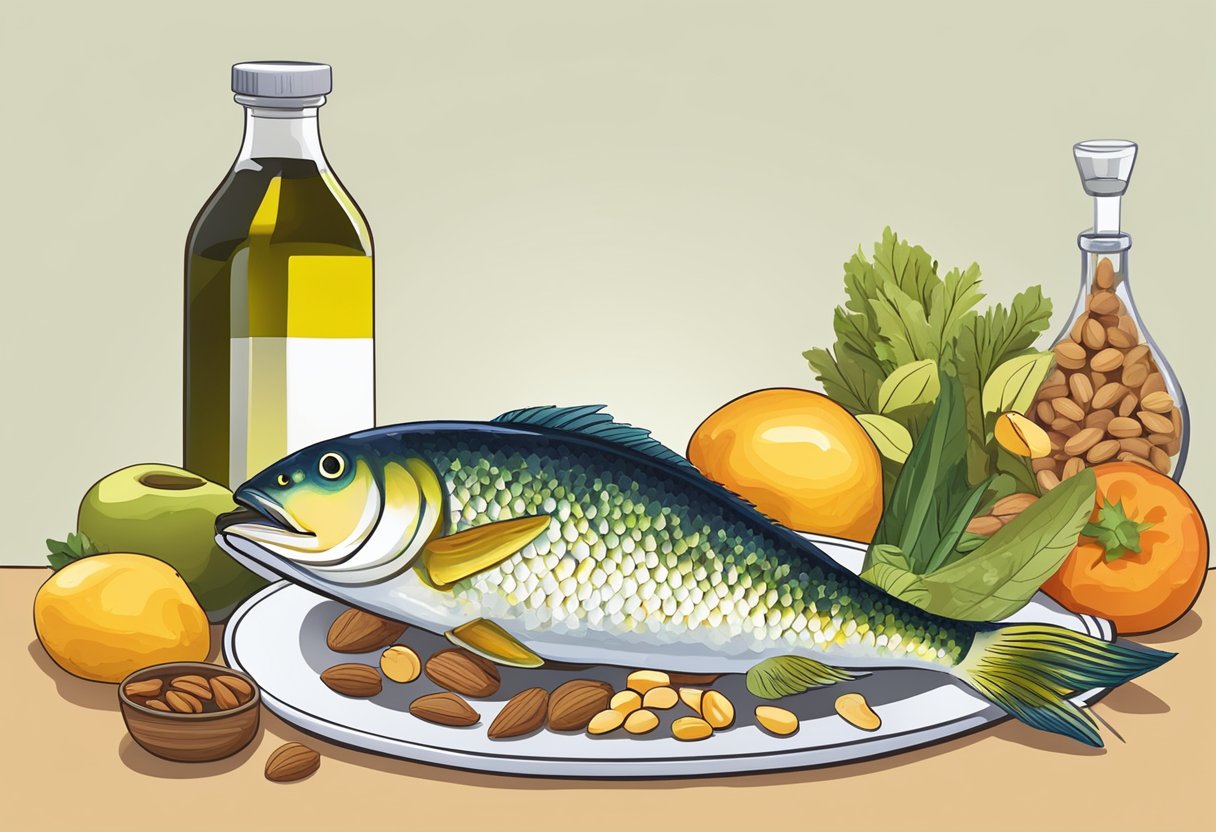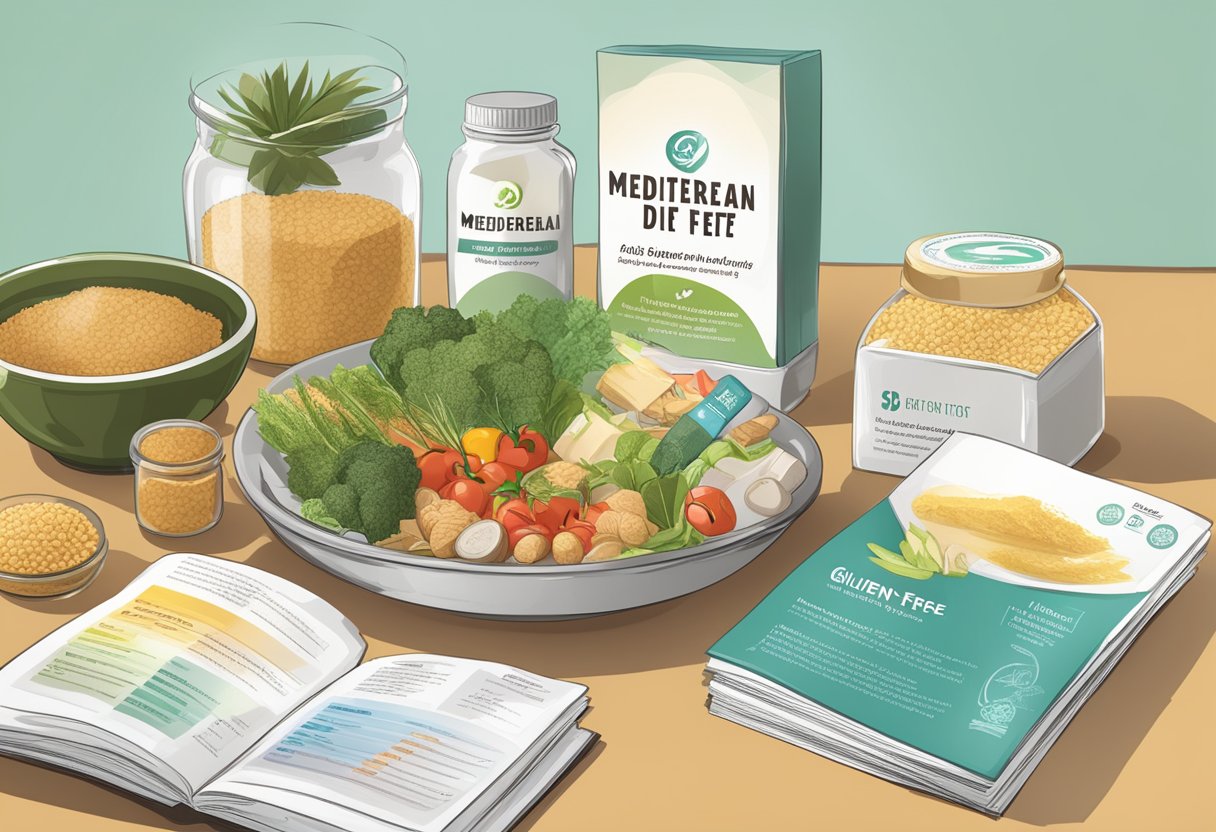The intersection of the gluten-free diet and the traditional Mediterranean diet presents a unique nutritional approach beneficial for individuals with celiac disease or gluten sensitivity. While the Mediterranean diet is renowned for its health benefits, particularly in reducing chronic disease risks, it typically includes gluten-containing foods such as wheat-based pasta and bread. However, by substituting these with gluten-free alternatives, individuals can enjoy the heart-healthy benefits of a Mediterranean eating pattern without the adverse effects of gluten. This blend of diets emphasizes a high intake of vegetables, fruits, legumes, nuts, seeds, and olive oil, alongside moderate amounts of fish, poultry, and dairy.

Creating a meal plan that is both Mediterranean and gluten-free requires careful consideration of nutritional needs and ingredient selection to ensure a balanced intake of essential nutrients. This is particularly important because the gluten-free diet alone often falls short in certain vitamins and minerals. Moreover, gluten-free whole foods form the cornerstone of this dietary approach, replacing processed foods that often contain hidden gluten. It also promotes a lifestyle that pairs dietary habits with physical activity and social engagement, pillars of the Mediterranean way of living that contribute to overall well-being.
Key Takeaways
- A gluten-free Mediterranean diet combines the health-promoting aspects of the Mediterranean dietary pattern with the needs of those avoiding gluten.
- Nutritional adequacy is critical when merging the gluten-free and Mediterranean diets, requiring the inclusion of nutrient-rich, gluten-free whole foods.
- Adopting this dietary approach supports a lifestyle that integrates nutritious eating, physical activity, and social connections for improved health outcomes.
Table of Contents
Understanding Celiac Disease and Gluten Sensitivity
Celiac disease and gluten sensitivity are distinct conditions, each affecting how individuals react to gluten. Their management is crucial for maintaining digestive health and overall well-being.
What Is Celiac Disease
Celiac disease is an autoimmune disorder prompted by the ingestion of gluten, a protein found in wheat, barley, and rye. When a person with celiac disease consumes gluten, their immune system mounts an attack against the small intestine, damaging its lining and hampering nutrient absorption. This can lead to serious health complications if left untreated.
The Role of Gluten in Digestive Health
Gluten does not cause harm to most people; however, for those with celiac disease or gluten sensitivity, it triggers an adverse reaction. Gluten can damage the intestinal lining in celiac disease, leading to symptoms such as bloating, gas, diarrhea, and weight loss. A gluten-free diet is imperative for these individuals.
Diagnosis and Management
Diagnosis of celiac disease typically involves blood tests and a biopsy of the small intestine to look for signs of damage. Upon a positive diagnosis, the primary treatment is a strict, lifelong gluten-free diet. This allows the intestines to heal and symptoms to improve. It is essential for patients to work with healthcare professionals to ensure their diet remains nutritionally balanced, especially when adhering to a specific dietary pattern such as the Mediterranean diet.
Fundamentals of the Mediterranean Diet
The Mediterranean Diet revolves around plant-based foods, heart-healthy fats, and whole grains, steering clear of processed foods and red meats. It’s an eating pattern recognized for its benefits to health and wellbeing.
Key Components of the Mediterranean Diet
- Olive Oil: A cornerstone for healthy fats, utilized instead of butter.
- Vegetables and Fruits: They form the diet’s base, with a variety encouraged at every meal.
- Nuts and Seeds: Included for their nutrient density and sources of fiber and protein.
- Legumes: Such as beans, lentils, and chickpeas, are integral, offering plant-based proteins and fiber.
- Whole Grains: Emphasis on gluten-free options, including quinoa and buckwheat, important for their nutrient content.
- Fish and Poultry: Recommended sources of animal protein, consumed in moderation.
- Eggs and Dairy: Included conservatively to contribute protein and nutrients.
- Wine: Optional and if consumed, typically in moderation with meals.
Health Benefits of the Mediterranean Diet
The Mediterranean Diet is associated with a myriad of health advantages, predominantly due to its high intake of healthy fats from olive oil, nuts, and seeds, which contribute to cardiovascular health. The abundance of fiber from vegetables, fruits, and legumes aids in digestion and weight management. Nutrients from these unprocessed foods support overall wellness.
Mediterranean Diet and Chronic Diseases
Chronic diseases such as heart disease, type 2 diabetes, and cardiovascular disease may be mitigated by adhering to the diet’s principles. The Mediterranean Diet helps regulate blood sugar and has been linked to lower incidences of such conditions, further highlighting its position as a beneficial eating practice for long-term health.
Adapting the Mediterranean Diet to Be Gluten-Free
The Mediterranean diet can be modified to exclude gluten, allowing individuals with celiac disease or gluten sensitivity to embrace this healthy eating pattern. By identifying gluten-containing foods and replacing them with suitable alternatives, adherents can maintain the diet’s nutritional integrity.
Identifying Gluten in Mediterranean Foods
Gluten is a protein found in wheat, barley, rye, and triticale. In a traditional Mediterranean diet, gluten may appear in breads, pastas, and certain processed foods. It is crucial for individuals following a gluten-free Mediterranean diet to read labels carefully and be aware of hidden sources of gluten, such as sauces and seasonings.
Gluten-Free Grains and Alternatives
Although wheat and other gluten-containing grains are staples in the Mediterranean diet, there are several nutritious gluten-free grains and alternatives available:
- Quinoa: A high-protein, versatile grain that works well in salads and as a substitute for couscous.
- Buckwheat: Despite its name, buckwheat is gluten-free and can be used in place of bulgur in tabbouleh.
- Corn: Polenta made from cornmeal is a comforting gluten-free option that pairs well with Mediterranean flavors.
- Rice: A staple grain that is naturally gluten-free and can be enjoyed in risottos or as a side dish.
- Oats: Oats are naturally gluten-free, but one should select varieties that are certified gluten-free to avoid cross-contamination.
- Sorghum: This grain can be used in breads, porridges, and a variety of other gluten-free recipes.
By incorporating these grains into their diet, individuals can still enjoy the health benefits of a Mediterranean diet while strictly adhering to a gluten-free lifestyle.
Designing a Gluten-Free Mediterranean Meal Plan

Creating a gluten-free Mediterranean meal plan involves choosing dishes rich in vegetables, fruits, lean proteins, and gluten-free grains. Each meal and snack should encompass the diet’s hallmarks of healthful fats and a diversity of plant-based foods.
Breakfast Options
- Oatmeal: A warm bowl of gluten-free oatmeal topped with fresh berries and a dash of cinnamon.
- Eggs: Scrambled eggs with spinach, tomatoes, and feta cheese, embodying the Mediterranean palate.
Lunch Suggestions
- Salads: A quinoa tabbouleh salad with cucumbers, tomatoes, and a lemon-olive oil dressing.
- Wraps: Gluten-free tortillas filled with grilled chicken, mixed greens, and tzatziki sauce.
Dinner Ideas
- Seafood: Grilled salmon with a side of roasted Mediterranean vegetables such as bell peppers and zucchini.
- Pasta: Gluten-free pasta paired with a flavorful puttanesca sauce rich in tomatoes, olives, and capers.
Snacking and Desserts
- Snacks: A selection of nuts, seeds, and sliced fruits for a midday energy boost.
- Sweets: Greek yogurt with honey and walnuts for a simple, yet authentic, dessert option.
Incorporating these meal and snack ideas can make a gluten-free Mediterranean diet both manageable and enjoyable, ensuring a variety of nutrients in one’s daily eating routine.
Nutritional Considerations

When adopting a gluten-free Mediterranean diet, one should pay careful attention to maintaining a balanced intake of macronutrients and ensuring sufficient levels of essential vitamins and minerals.
Maintaining Balanced Macronutrients
Protein is a crucial macronutrient, and individuals following a gluten-free Mediterranean diet can obtain it from sources like seafood, poultry, and legumes. It’s important to note that legumes also provide dietary fiber, which supports digestive health. Fats should primarily come from healthy sources such as olive oil and nuts, which are staples of the Mediterranean diet.
The diet emphasizes the high intake of vegetables, fruits, whole grains, and legumes. These foods not only supply valuable fiber but are also important sources of energy and nutrients. However, because traditional whole grains are often sources of gluten, individuals must choose gluten-free alternatives like quinoa or brown rice to achieve a balanced diet.
Essential Vitamins and Minerals
Individuals must ensure they’re getting enough vitamins and minerals, especially when managing a gluten-free diet. Essential nutrients like iron, calcium, and vitamin D can sometimes be lower in those on strict gluten-free diets. Leafy greens, fortified gluten-free products, and sunlight exposure can help maintain these levels.
B vitamins are vital for a range of bodily functions and are found in various Mediterranean diet components such as poultry and legumes. Since some gluten-free diets might lack sufficient B vitamins, one should consider incorporating B vitamin-rich foods within their Mediterranean dietary choices or discuss supplementation with a healthcare provider.
Given that the gluten-free diet may not always provide adequate levels of certain nutrients, it is often recommended to take specific nutritional supplements to correct potential deficiencies. Multivitamin/mineral supplements tailored for one’s age, gender, and specific dietary needs can be beneficial.
Incorporating Gluten-Free Whole Foods
When adopting a gluten-free Mediterranean diet, focus on natural whole foods that are rich in nutrients. This ensures a balanced intake of vitamins, fiber, and minerals, essential for health and well-being.
Vegetables and Fruits
Vegetables and fruits are staples in a gluten-free Mediterranean diet, providing a wide range of vitamins, minerals, and fiber. Leafy greens such as spinach and kale, along with cruciferous vegetables like broccoli and Brussels sprouts, are excellent choices. Include a variety of colorful fruits, such as berries, apples, and citrus fruits, to benefit from their different nutrients and antioxidants.
- Vegetables to Include:
- Leafy greens (spinach, kale)
- Cruciferous vegetables (broccoli, cauliflower)
- Fruits to Include:
- Berries (strawberries, blueberries)
- Citrus fruits (oranges, lemons)
Proteins: Plant-Based and Animal Sources
Proteins in a gluten-free Mediterranean diet come from both plant-based and animal sources. Legumes such as lentils, chickpeas, and beans are valuable plant proteins that also offer dietary fiber. For animal proteins, focus on fish like salmon, rich in omega-3 fatty acids, and lean meats such as chicken. Limit the consumption of red meats and opt for grass-fed and organic selections when possible.
- Plant-Based Proteins:
- Legumes (lentils, chickpeas)
- Animal Proteins:
- Fish (salmon, sardines)
- Poultry (chicken, turkey)
Healthy Fats and Oils
The Mediterranean diet emphasizes healthy fats and oils, which are vital for heart health and inflammation control. Olive oil, particularly extra-virgin olive oil, is a primary source of fat and is used both for cooking and as a dressing. Nuts and seeds, including almonds, walnuts, and flaxseeds, are also encouraged for their good fats and can be incorporated as snacks or as additions to salads and dishes.
- Sources of Healthy Fats:
- Olive Oil (preferably extra-virgin)
- Nuts and Seeds (almonds, walnuts, flaxseeds)
Lifestyle Considerations on a Gluten-Free Mediterranean Diet

Adopting a gluten-free Mediterranean diet integrates both dietary and lifestyle changes that can benefit one’s overall wellbeing. This approach involves a balance of physical activity, weight management, and strategies to cope with inflammation and aging.
Physical Activity and Exercise
Physical activity is a cornerstone of the Mediterranean lifestyle, complementing the diet’s nutritional benefits. Those following a gluten-free Mediterranean diet might consider daily exercise such as walking, swimming, or yoga to enhance cardiovascular health and maintain muscle strength. The focus should be on consistency and enjoyment to foster a sustainable habit.
Managing Weight and Energy Levels
A gluten-free Mediterranean diet inherently emphasizes whole foods, which can help in managing weight. Balancing intake of fruits, vegetables, lean proteins, and gluten-free whole grains assists in maintaining stable energy levels throughout the day. Incorporating healthy fats like olive oil provides satiety and may prevent overeating.
Coping with Inflammation and Aging
The diet’s rich supply of anti-inflammatory foods, including leafy greens and fatty fish like salmon, supports the body’s natural ability to combat inflammation. The antioxidants found in the diet’s staples, such as berries and nuts, contribute to slowing down the aging process, making the gluten-free Mediterranean diet beneficial for long-term health and vitality.
Support and Resources

Individuals looking to adopt a gluten-free Mediterranean diet can access a wealth of resources and expert guidance to ensure nutritional adequacy and health benefits. These resources are especially pivotal for those with celiac disease or gluten sensitivity for whom dietary compliance is critical.
Finding a Registered Dietitian
For personalized dietary advice, individuals should consider consulting with a registered dietitian who specializes in celiac disease and the gluten-free diet. Dietitians can provide tailored eating plans that combine the principles of the Mediterranean diet with the gluten-free requirements. Dietitians will also guide on how to ensure a balanced intake of nutrients, often a challenge in restrictive diets. For finding a local dietitian, organizations such as The Academy of Nutrition and Dietetics offer a searchable database on their website.
Educational Material from Celiac Disease Foundation
The Celiac Disease Foundation introduces valuable educational material, including a 7-Day Gluten-Free Mediterranean Diet Meal Plan. This material is an asset for those requiring strict gluten-free nutrition, offering structured guidance and meal planning. It simplifies the process of meal preparation, making it easier to adhere to the diet while incorporating the variety and flavors of the Mediterranean.
Frequently Asked Questions

This section addresses common inquiries about maintaining a gluten-free Mediterranean lifestyle, including diet specifics and supplement information.
What are some typical breakfast options for someone following a gluten-free Mediterranean diet?
Typical breakfast choices include Greek yogurt with fruit, gluten-free granola, and omelets with fresh vegetables. Ingredients should be fresh and whole, consistent with the Mediterranean emphasis on quality and nutrition.
Where can I find a comprehensive gluten-free Mediterranean diet meal plan?
A comprehensive meal plan that aligns with both gluten-free and Mediterranean dietary guidelines can be found via the Celiac Disease Foundation.
How do I adapt traditional Mediterranean recipes to be gluten-free?
Adapting recipes often involves substituting gluten-containing ingredients with gluten-free alternatives. For example, using gluten-free pasta or bread. Natural, unprocessed Mediterranean foods like fruits, vegetables, legumes, and nuts are inherently gluten-free.
What supplements might be beneficial for someone on a gluten-free Mediterranean diet?
For individuals on a gluten-free diet, supplements like Vitamin B12 and iron can be particularly beneficial to ensure nutritional needs are met, as these nutrients might be lacking due to the elimination of certain grains.
What items should I include on my shopping list for a gluten-free Mediterranean diet?
A shopping list for this diet should include fresh produce, lean proteins such as fish and poultry, legumes, nuts, seeds, and gluten-free grains like quinoa and rice. Healthy fats, like olive oil and avocados, are also staples.
Are there any recommended cookbooks that focus on gluten-free Mediterranean cuisine?
There are cookbooks designed to support a gluten-free Mediterranean lifestyle. These books provide recipes that combine traditional Mediterranean cooking with the necessary gluten-free substitutes to maintain health without sacrificing flavor.



